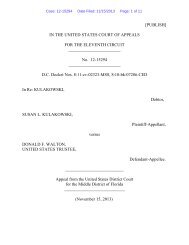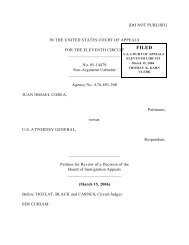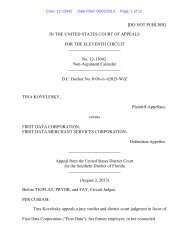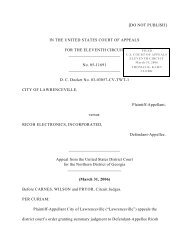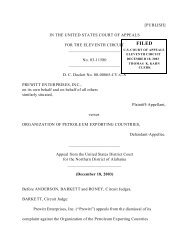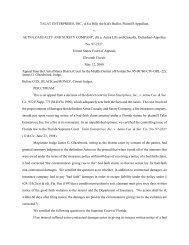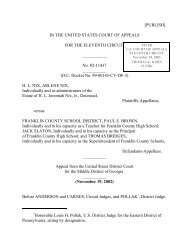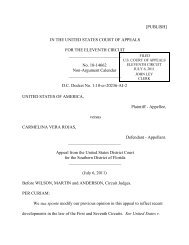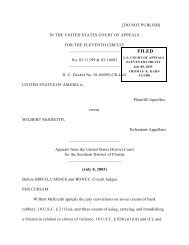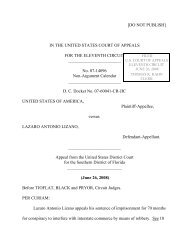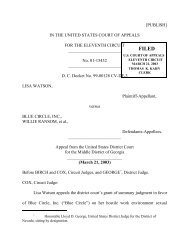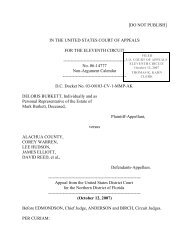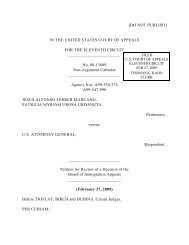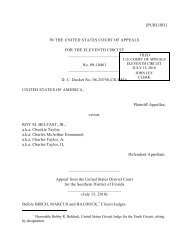Iverson Taylor v. Keysha Nichole Ladonna Taylor - Court of Appeals ...
Iverson Taylor v. Keysha Nichole Ladonna Taylor - Court of Appeals ...
Iverson Taylor v. Keysha Nichole Ladonna Taylor - Court of Appeals ...
Create successful ePaper yourself
Turn your PDF publications into a flip-book with our unique Google optimized e-Paper software.
IVERSON TAYLOR,<br />
IN THE UNITED STATES COURT OF APPEALS<br />
FOR THE ELEVENTH CIRCUIT<br />
________________________<br />
No. 12-10393<br />
Non-Argument Calendar<br />
________________________<br />
D.C. Docket No. 0:10-cv-61287-AJ<br />
[DO NOT PUBLISH]<br />
llllllllllllllllllllllllllllllllllllllll Plaintiff - Appellant,<br />
versus<br />
KEYSHA NICHOLE LADONNA TAYLOR,<br />
llllllllllllllllllllllllllllllllllllllll Defendant - Appellee.<br />
________________________<br />
Appeal from the United States District <strong>Court</strong><br />
for the Southern District <strong>of</strong> Florida<br />
________________________<br />
(December 20, 2012)<br />
Before CARNES, BARKETT, and MARCUS, Circuit Judges.<br />
PER CURIAM:<br />
Case: 12-10393 Date Filed: 12/20/2012 Page: 1 <strong>of</strong> 8
Mr. <strong>Iverson</strong> <strong>Taylor</strong>, a British citizen, has petitioned for relief under the<br />
Hague Convention on the Civil Aspects <strong>of</strong> International Child Abduction, T.I.A.S.<br />
No. 11670, 1343 U.N.T.S. 89, reprinted in 51 Fed. Reg. 10,494 (March 26, 1986),<br />
and its implementing legislation, the International Child Abduction Remedies Act,<br />
42 U.S.C. § 11603(b). He alleges that his wife, Ms. <strong>Keysha</strong> <strong>Taylor</strong>, an American<br />
citizen, has wrongfully retained their daughter, A.T., in Florida since February<br />
2009.<br />
Case: 12-10393 Date Filed: 12/20/2012 Page: 2 <strong>of</strong> 8<br />
I.<br />
The district court conducted an evidentiary hearing in this case. The court<br />
found Mr. <strong>Taylor</strong> untrustworthy and explicitly found that his testimony was not<br />
credible in a number <strong>of</strong> areas. Given Mr. <strong>Taylor</strong>’s long history <strong>of</strong> deception and<br />
fraudulent activity, this finding is not clearly erroneous. See Baran v. Beaty, 526<br />
F.3d 1340, 1342 (11th Cir. 2008) (“[The petitioner] has not shown the district court<br />
clearly erred by crediting [the respondent]’s testimony. Consequently, we draw the<br />
following facts from the district court’s findings <strong>of</strong> fact.”). Therefore, we accept<br />
the district court’s findings <strong>of</strong> fact.<br />
The <strong>Taylor</strong>s were married in the United States in 2003. After Mr. <strong>Taylor</strong><br />
was deported to the United Kingdom for failing to disclose his three theft<br />
convictions when he entered the United States, Ms. <strong>Taylor</strong> joined him. They lived<br />
2
in the United Kingdom together from 2005 until 2009. A.T. was born there in<br />
2007.<br />
Case: 12-10393 Date Filed: 12/20/2012 Page: 3 <strong>of</strong> 8<br />
Mr. <strong>Taylor</strong> had constant money problems, and he frequently lied to his wife<br />
and others to swindle money from them. During their marriage, he was arrested<br />
for fraud, but those charges were ultimately dismissed. 1 Ms. <strong>Taylor</strong> found<br />
evidence in Mr. <strong>Taylor</strong>’s emails that he was engaging in fraudulent activities. She<br />
also began receiving harassing phone calls from Mr. <strong>Taylor</strong>’s creditors at their<br />
home. In November 2008, she received a call from a man who told her that if Mr.<br />
<strong>Taylor</strong> did not pay what he owed, “he would be dead and so would [she].” There<br />
were several more calls from that caller during November and December <strong>of</strong> 2008.<br />
Ms. <strong>Taylor</strong>, an attorney licensed to practice in Florida, was able to support<br />
her family for a short time in the United Kingdom by working at a law firm. After<br />
A.T. was born, she supported the family with her maternity leave funds and then<br />
with funds paid to her based on a separation agreement with her employer. After<br />
this money ran out, however, she was unable to find another job in the United<br />
Kingdom. Mr. <strong>Taylor</strong> did not provide a reliable income, and the family was<br />
evicted from their home in the United Kingdom in December 2008. They were<br />
able to move into another apartment when, as Ms. <strong>Taylor</strong> testified, Mr. <strong>Taylor</strong><br />
1 During the evidentiary hearing in the case currently before this <strong>Court</strong>, Mr. <strong>Taylor</strong> was arrested<br />
again on charges <strong>of</strong> misrepresentation that had been brought by three different people. Those<br />
charges were later dismissed.<br />
3
“came up with a large amount <strong>of</strong> cash.” She did not know the source <strong>of</strong> that cash<br />
but believed it was from illegal activities. Soon after that, they had difficulty<br />
paying the rent again. Mr. <strong>Taylor</strong> is currently living in a temporary location and<br />
plans to move if A.T. is returned to him. He remains unemployed and claims he<br />
supports himself with “outstanding debts and collections on old accounts.”<br />
Because <strong>of</strong> the financial difficulties, the fighting in their marriage, and the<br />
frightening phone calls, Ms. <strong>Taylor</strong> told Mr. <strong>Taylor</strong> she wanted to leave the United<br />
Kingdom and take A.T. with her. He refused to give her A.T.’s passport. He also<br />
told her that he “knew people” in the United Kingdom who could “take care” <strong>of</strong><br />
her. It was only after she signed an agreement promising to bring A.T. back the<br />
next month that he gave her the passport. Ms. <strong>Taylor</strong> returned with A.T. to her<br />
parents’ house in Florida.<br />
Case: 12-10393 Date Filed: 12/20/2012 Page: 4 <strong>of</strong> 8<br />
When Ms. <strong>Taylor</strong> told Mr. <strong>Taylor</strong> that she would not be returning A.T. to the<br />
United Kingdom, he began to threaten her and her parents. He told Ms. <strong>Taylor</strong>’s<br />
mother over the phone, “I am not gonna stop until I destroy your daughter. She’s<br />
never gonna work in the United States again.” In another call, he told Ms. <strong>Taylor</strong><br />
that he knew people in Florida who could “take care” <strong>of</strong> her and he could “have<br />
somebody come to [her] house, and when [her] father opens the door, shoot him in<br />
the face.” He also sent Ms. <strong>Taylor</strong> an email saying, “You are going to want my<br />
4
mercy soon and you won’t get it . . . God help you if anything happens to my<br />
child.”<br />
After Ms. <strong>Taylor</strong> returned to the United States, she filed for bankruptcy. She<br />
has since gotten a job and is now making $85,000 a year. Because <strong>of</strong> the<br />
remaining debts from her marriage, she testified that she still “live[s] paycheck to<br />
paycheck.” She is unsure if she would be able to get a job in the United Kingdom<br />
if she and A.T. moved back, both because <strong>of</strong> the poor market and because her<br />
residency status is uncertain. 2<br />
The Hague Convention on the Civil Aspects <strong>of</strong> International Child<br />
Abduction is designed “[t]o protect children internationally from the harmful<br />
II.<br />
effects <strong>of</strong> their wrongful removal or retention and to establish procedures to ensure<br />
their prompt return to the State <strong>of</strong> their habitual residence.” Hanley v. Roy, 485<br />
F.3d 641, 644 (11th Cir. 2007) (quoting Hague Convention on the Civil Aspects <strong>of</strong><br />
International Child Abduction, supra p.1--2, pmbl.). Under the Convention, if a<br />
petitioner shows that a child was wrongfully removed from the country <strong>of</strong> her<br />
habitual residence, the court must order the child returned unless the respondent<br />
can establish one <strong>of</strong> the affirmative defenses provided for under the Convention.<br />
Baran, 526 F.3d at 1345.<br />
Case: 12-10393 Date Filed: 12/20/2012 Page: 5 <strong>of</strong> 8<br />
2 Ms. <strong>Taylor</strong> believes that the residency status she received in the United Kingdom in 2008 did<br />
not become permanent because she left the country less than a year after receiving it.<br />
5
Case: 12-10393 Date Filed: 12/20/2012 Page: 6 <strong>of</strong> 8<br />
The district court concluded that Ms. <strong>Taylor</strong> had wrongfully taken A.T. from<br />
her habitual residence in the United Kingdom. She did not dispute that finding.<br />
Instead, she asserted that returning A.T. would expose her to a “grave risk” as<br />
described in Article 13(b). 3 The district court agreed that it would and did not<br />
order A.T. returned to the United Kingdom. Whether there is a “grave risk” to the<br />
child as defined in Article 13(b) <strong>of</strong> the Convention is a mixed question <strong>of</strong> law and<br />
fact, which we review de novo. Baran, 526 F.3d at 1345. We review the district<br />
court’s factual findings only for clear error and give substantial deference to the<br />
credibility determinations made by the district court. Furnes v. Reeves, 362 F.3d<br />
702, 710, 724 n.21 (11th Cir. 2004).<br />
Article 13(b) provides that a state is not bound to return a child if “there is<br />
grave risk that his or her return would expose the child to physical or psychological<br />
harm or otherwise place the child in an intolerable situation.” Baran, 526 F.3d at<br />
1345 (quoting Article 13(b)). The respondent carries the burden <strong>of</strong> proving “by<br />
clear and convincing evidence” that the grave risk <strong>of</strong> harm exception applies. Id.;<br />
see also 42 U.S.C. § 11603(e)(2)(A).<br />
The Convention presumes that a wrongfully taken child should be returned<br />
to her place <strong>of</strong> habitual residence. Whallon v. Lynn, 230 F.3d 450, 460 (1st Cir.<br />
3 Ms. <strong>Taylor</strong> also asserted the affirmative defense that Mr. <strong>Taylor</strong> waited over a year to file the<br />
petition and A.T. was well-settled. The district court found that she had not proven that defense,<br />
and she has not raised that ruling in this appeal.<br />
6
2000). For “grave risk” to be established, the potential harm must be “a great deal<br />
more than minimal,” and the risk <strong>of</strong> that harm must be “grave.” Walsh v. Walsh,<br />
221 F.3d 204, 218 (1st Cir. 2000).<br />
In this case, the district court provided two primary justifications for its<br />
finding that sending A.T. back to the United Kingdom would subject her to a<br />
“grave risk” <strong>of</strong> harm. First, the court reasoned that the anonymous death threats<br />
Ms. <strong>Taylor</strong> received were indicative <strong>of</strong> future violence: if one person threatened<br />
Ms. <strong>Taylor</strong>, there are likely others who “would not hesitate to threaten to kill,<br />
kidnap, or do physical harm to A.T. in order to get Mr. <strong>Taylor</strong> to pay what he<br />
owes.” 4 The court made an explicit finding that Mr. <strong>Taylor</strong>’s testimony<br />
concerning his current source <strong>of</strong> income (collection <strong>of</strong> “outstanding debts”) was<br />
not credible and concluded that he had been and continued to be engaged in<br />
fraudulent activities.<br />
Case: 12-10393 Date Filed: 12/20/2012 Page: 7 <strong>of</strong> 8<br />
Second, the court focused on the threats Mr. <strong>Taylor</strong> has made against Ms.<br />
<strong>Taylor</strong>: telling her he knew people in the United Kingdom and in the United States<br />
who could “take care” <strong>of</strong> her; threatening to send someone to shoot her father;<br />
threatening to ruin her pr<strong>of</strong>essionally; promising her that she would want his mercy<br />
soon and would not get it. The court did not credit Mr. <strong>Taylor</strong>’s assertion that he<br />
4 Although the unknown caller made no mention <strong>of</strong> A.T., the district court found that if the caller<br />
was willing to hurt Mr. <strong>Taylor</strong>’s wife to recover the debt, he would also be willing to hurt Mr.<br />
<strong>Taylor</strong>’s child.<br />
7
never threatened Ms. <strong>Taylor</strong> or her parents and found that “Mr. <strong>Taylor</strong> threatened<br />
to use others to physically harm (and maybe even kill) Ms. <strong>Taylor</strong>.”<br />
As the district court recognized, this case is unique because the risk to A.T.<br />
stems not only from threats made by her father but also from threats made by an<br />
unknown third party. The district court’s credibility determinations about the<br />
nature <strong>of</strong> the threats and Mr. <strong>Taylor</strong>’s continued participation in fraudulent<br />
activities are not clearly erroneous. The court found that those fraudulent activities<br />
have already created---and likely will continue to create---a substantial risk <strong>of</strong><br />
serious harm to Mr. <strong>Taylor</strong>’s family. Based on the unique facts <strong>of</strong> this case and the<br />
district court’s specific credibility determinations, the court did not err by<br />
determining that Ms. <strong>Taylor</strong> had established a grave risk <strong>of</strong> harm to A.T. if she is<br />
returned to live with Mr. <strong>Taylor</strong> in the United Kingdom.<br />
AFFIRMED.<br />
Case: 12-10393 Date Filed: 12/20/2012 Page: 8 <strong>of</strong> 8<br />
8



